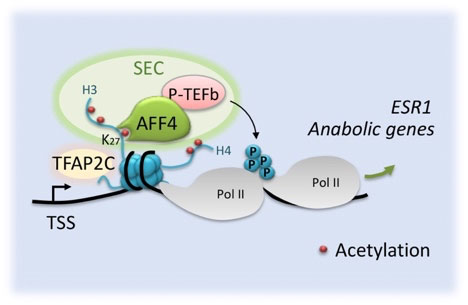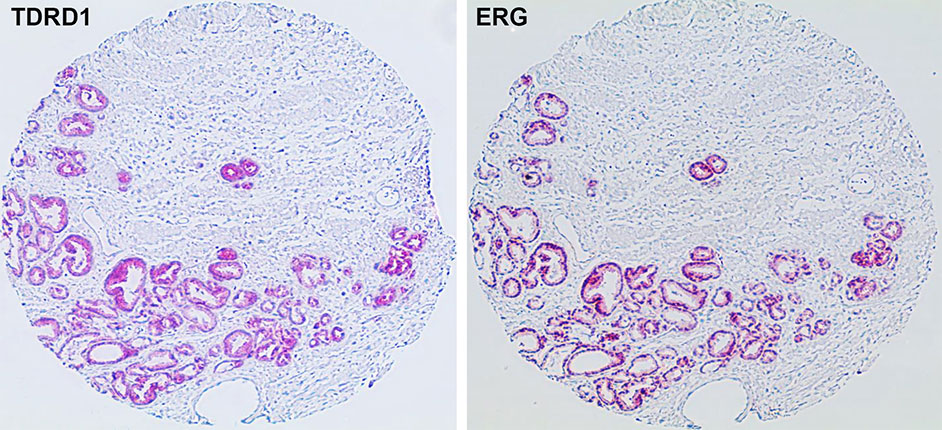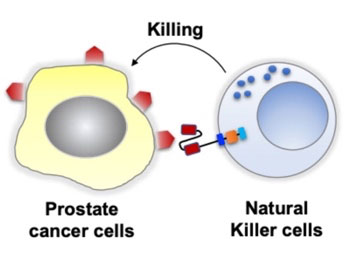Feng Lab
Qin Feng, Ph.D.
Associate Professor
Department of Biology and Biochemistry
Office: SERC, 3009
Contact: qfeng4@central.uh.edu - 832-842-8824
Epigenetic Regulation of Gene Expression in HIV and cancer

Epigenetics is defined as the study of heritable changes caused by mechanisms other than alterations in the DNA sequence. Core histones, the fundamental units of chromatin structure, are subject to many types of post-translational modifications such as acetylation, methylation, phosphorylation, ubiquitination, crotonylation, etc. Depending on the types and locations, these modifications can regulate gene expression either positively or negatively. Aberrant gene expression caused by deregulated epigenetics is implicated in the initiation and progression of many diseases. Our work has mainly focused on transcriptional coregulators, including histone modifying enzymes and acetylated histone binding proteins. We aim to understand the molecular events that lead to aberrant regulation of gene expression in human diseases, such as AIDS and cancer, and ultimately develop novel therapeutic agents.
TDRD1 in prostate tumorigenesis

Tudor domain containing 1 (TDRD1) is a germ cell specific protein containing four Tudor domains, the signature domains that bind to methylated lysine or arginine. Under physiological condition, TDRD1 is solely expressed in testis and ovary, but not in any other tissues. However, its expression is detected in ~70% of primary prostate tumors, suggesting TDRD1 is important in prostate cancer development. This project aims to understand how TDRD1 contributes to prostate tumorigenesis.
Prostate cancer immunotherapy

Prostate cancer has an immunologically “cold” nature and is notoriously resistant to checkpoint blockade immunotherapy. This is likely due to low level of somatic mutations in prostate tumors. As a result, prostate cancer cells cannot be recognized by T cells as foreigners. We aim to develop PSMA-specific CAR-NK cells for prostate cancer treatment. Because PSMA (prostate-specific membrane antigen) is a cell membrane protein that selectively expresses in normal prostate and highly elevated in prostate tumors, the PSMA-specific CAR-NK cells can direct the cytotoxicity toward prostate cancer cells and therefore is a promising strategy to overcome the “cold” nature of prostate tumors.
Funding



Qin Feng, Ph.D.
Associate Professor
Department of Biology and Biochemistry
University of Houston
Houston, Texas 77204-5001
Office: SERC 545, Room 3009
Phone: 832-842-8824
qfeng4@central.uh.edu

Hui Huang
Graduate Student

Nobendu Mukerjee
Graduate Student

Eric Pan
Graduate Student

Kevin Song
Graduate Student
Alumni
Amrita Barua
Graduate Student
Yujing Gao, Ph.D.
Yali Han, M.S.
Researcher
Hussain Kalavadwala
Taevien Loa
Graduate Student
Aroshi Mitra
Graduate Student
Tran V Nguyen
Intern
Salman Promon
Graduate Student
Jacky Wu
Graduate Student
Sharon Zachariah
Zheng Zhang, M.D., Ph.D.
Tianyi Zhou
Graduate Student
- Gao Y, Chen L, Han Y, Wu F, Yang WS, Zhang Z, Huo T, Zhu Y, Yu C, Kim H, Lee M, Tang Z, Phillips K, He B, Jung SY, Song Y, Zhu B, Xu RM, Feng Q. Acetylation of histone H3K27 signals the transcriptional elongation for estrogen receptor alpha. Commun Biol. 2020 Apr 7;3(1):165. doi: 10.1038/s42003-020-0898-0. PubMed PMID: 32265480.
- Fu X, Pereira R, De Angelis C, Veeraraghavan J, Nanda S, Qin L, Cataldo ML, Sethunath V, Mehravaran S, Gutierrez C, Chamness GC, Feng Q, O'Malley BW, Selenica P, Weigelt B, Reis-Filho JS, Cohen O, Wagle N, Nardone A, Jeselsohn R, Brown M, Rimawi MF, Osborne CK, Schiff R. FOXA1 upregulation promotes enhancer and transcriptional reprogramming in endocrine-resistant breast cancer. Proc Natl Acad Sci U S A. 2019 Dec 11;. doi: 10.1073/pnas.1911584116. PubMed PMID: 31826955; PubMed Central PMCID: PMC6936436.
- Feng Q, He B. Androgen Receptor Signaling in the Development of Castration-Resistant Prostate Cancer. Front Oncol. 2019;9:858. doi: 10.3389/fonc.2019.00858. eCollection 2019. Review. PubMed PMID: 31552182; PubMed Central PMCID: PMC6738163.
- Zhang Z, Nikolai BC, Gates LA, Jung SY, Siwak EB, He B, Rice AP, O'Malley BW, Feng Q. Crosstalk between histone modifications indicates that inhibition of arginine methyltransferase CARM1 activity reverses HIV latency. Nucleic Acids Res. 2017 Sep 19;45(16):9348-9360. doi: 10.1093/nar/gkx550. PubMed PMID: 28637181; PubMed Central PMCID: PMC5766202.
- Yi P, Wang Z, Feng Q, Chou CK, Pintilie GD, Shen H, Foulds CE, Fan G, Serysheva I, Ludtke SJ, Schmid MF, Hung MC, Chiu W, O'Malley BW. Structural and Functional Impacts of ER Coactivator Sequential Recruitment. Mol Cell. 2017 Sep 7;67(5):733-743.e4. doi: 10.1016/j.molcel.2017.07.026. Epub 2017 Aug 24. PubMed PMID: 28844863; PubMed Central PMCID: PMC5657569.
- Gates LA, Shi J, Rohira AD, Feng Q, Zhu B, Bedford MT, Sagum CA, Jung SY, Qin J, Tsai MJ, Tsai SY, Li W, Foulds CE, O'Malley BW.Acetylation on histone H3 lysine 9 mediates a switch from transcription initiation to elongation. J Biol Chem. 2017 Sep 1;292(35):14456-14472. doi: 10.1074/jbc.M117.802074. Epub 2017 Jul 17. PubMed PMID: 28717009; PubMed Central PMCID: PMC5582839.
- Nikolai BC, Feng Q. HIV Latency Gets a New Histone Mark. Cell Host Microbe. 2017 May 10;21(5):549-550. doi: 10.1016/j.chom.2017.04.012. PubMed PMID: 28494231; PubMed Central PMCID: PMC6484844.
- Xiao L, Lanz RB, Frolov A, Castro PD, Zhang Z, Dong B, Xue W, Jung SY, Lydon JP, Edwards DP, Mancini MA, Feng Q, Ittmann MM, He B.The Germ Cell Gene TDRD1 as an ERG Target Gene and a Novel Prostate Cancer Biomarker. Prostate. 2016 Oct;76(14):1271-84. doi: 10.1002/pros.23213. Epub 2016 Jun 8. PubMed PMID: 27272765.
- Xiao L, Feng Q, Zhang Z, Wang F, Lydon JP, Ittmann MM, Xin L, Mitsiades N, He B. The essential role of GATA transcription factors in adult murine prostate. Oncotarget. 2016 Jul 26;7(30):47891-47903. doi: 10.18632/oncotarget.10294. PubMed PMID: 27374105; PubMed Central PMCID: PMC5216986.
- Kwon OJ, Zhang L, Wang J, Su Q, Feng Q, Zhang XH, Mani SA, Paulter R, Creighton CJ, Ittmann MM, Xin L. Notch promotes tumor metastasis in a prostate-specific Pten-null mouse model. J Clin Invest. 2016 Jul 1;126(7):2626-41. doi: 10.1172/JCI84637. Epub 2016 Jun 13. PubMed PMID: 27294523; PubMed Central PMCID: PMC4922719.
- Zhang Z, Lanz RB, Xiao L, Wang L, Hartig SM, Ittmann MM, Feng Q, He B. The tumor suppressive miR-200b subfamily is an ERG target gene in human prostate tumors. Oncotarget. 2016 Jun 21;7(25):37993-38003. doi: 10.18632/oncotarget.9366. PubMed PMID: 27191272; PubMed Central PMCID: PMC5122366.
- Yi P, Wang Z, Feng Q, Pintilie GD, Foulds CE, Lanz RB, Ludtke SJ, Schmid MF, Chiu W, O'Malley BW. Structure of a biologically active estrogen receptor-coactivator complex on DNA. Mol Cell. 2015 Mar 19;57(6):1047-1058. doi: 10.1016/j.molcel.2015.01.025. Epub 2015 Feb 26. PubMed PMID: 25728767; PubMed Central PMCID: PMC4369429.
- He B, Lanz RB, Fiskus W, Geng C, Yi P, Hartig SM, Rajapakshe K, Shou J, Wei L, Shah SS, Foley C, Chew SA, Eedunuri VK, Bedoya DJ, Feng Q, Minami T, Mitsiades CS, Frolov A, Weigel NL, Hilsenbeck SG, Rosen DG, Palzkill T, Ittmann MM, Song Y, Coarfa C, O'Malley BW, Mitsiades N. GATA2 facilitates steroid receptor coactivator recruitment to the androgen receptor complex. Proc Natl Acad Sci U S A.2014 Dec 23;111(51):18261-6. doi: 10.1073/pnas.1421415111. Epub 2014 Dec 8. PubMed PMID: 25489091; PubMed Central PMCID: PMC4280633.
- Feng Q, O'Malley BW. Nuclear receptor modulation--role of coregulators in selective estrogen receptor modulator (SERM) actions.Steroids. 2014 Nov;90:39-43. doi: 10.1016/j.steroids.2014.06.008. Epub 2014 Jun 16. PubMed PMID: 24945111; PubMed Central PMCID: PMC4192004.
- Feng Q, Zhang Z, Shea MJ, Creighton CJ, Coarfa C, Hilsenbeck SG, Lanz R, He B, Wang L, Fu X, Nardone A, Song Y, Bradner J, Mitsiades N, Mitsiades CS, Osborne CK, Schiff R, O'Malley BW. An epigenomic approach to therapy for tamoxifen-resistant breast cancer. Cell Res. 2014 Jul;24(7):809-19. doi: 10.1038/cr.2014.71. Epub 2014 May 30. PubMed PMID: 24874954; PubMed Central PMCID: PMC4085766.
- Foulds CE, Feng Q, Ding C, Bailey S, Hunsaker TL, Malovannaya A, Hamilton RA, Gates LA, Zhang Z, Li C, Chan D, Bajaj A, Callaway CG, Edwards DP, Lonard DM, Tsai SY, Tsai MJ, Qin J, O'Malley BW. Proteomic analysis of coregulators bound to ERα on DNA and nucleosomes reveals coregulator dynamics. Mol Cell. 2013 Jul 25;51(2):185-99. doi: 10.1016/j.molcel.2013.06.007. Epub 2013 Jul 11. PubMed PMID: 23850489; PubMed Central PMCID: PMC3900250.
- Hartig SM, Feng Q, Ochsner SA, Xiao R, McKenna NJ, McGuire SE, He B. Androgen receptor agonism promotes an osteogenic gene program in preadipocytes. Biochem Biophys Res Commun. 2013 May 3;434(2):357-62. doi: 10.1016/j.bbrc.2013.03.078. Epub 2013 Apr 6. PubMed PMID: 23567971; PubMed Central PMCID: PMC3763992.
- He B, Kim TH, Kommagani R, Feng Q, Lanz RB, Jeong JW, DeMayo FJ, Katzenellenbogen BS, Lydon JP, O'Malley BW. Estrogen-regulated prohibitin is required for mouse uterine development and adult function. Endocrinology. 2011 Mar;152(3):1047-56. doi: 10.1210/en.2010-0732. Epub 2011 Jan 5. PubMed PMID: 21209023; PubMed Central PMCID: PMC3040048.
- Feng Q, He B, Jung SY, Song Y, Qin J, Tsai SY, Tsai MJ, O'Malley BW. Biochemical control of CARM1 enzymatic activity by phosphorylation. J Biol Chem. 2009 Dec 25;284(52):36167-74. doi: 10.1074/jbc.M109.065524. Epub 2009 Oct 20. PubMed PMID: 19843527; PubMed Central PMCID: PMC2794732.
- Giamas G, Castellano L, Feng Q, Knippschild U, Jacob J, Thomas RS, Coombes RC, Smith CL, Jiao LR, Stebbing J. CK1delta modulates the transcriptional activity of ERalpha via AIB1 in an estrogen-dependent manner and regulates ERalpha-AIB1 interactions. Nucleic Acids Res. 2009 May;37(9):3110-23. doi: 10.1093/nar/gkp136. Epub 2009 Apr 1. PubMed PMID: 19339517; PubMed Central PMCID: PMC2685087.
- Fu J, Jiang J, Li J, Wang S, Shi G, Feng Q, White E, Qin J, Wong J. Deleted in breast cancer 1, a novel androgen receptor (AR) coactivator that promotes AR DNA-binding activity. J Biol Chem. 2009 Mar 13;284(11):6832-40. doi: 10.1074/jbc.M808988200. Epub 2009 Jan 5. PubMed PMID: 19126541; PubMed Central PMCID: PMC2652261.
- Yi P, Feng Q, Amazit L, Lonard DM, Tsai SY, Tsai MJ, O'Malley BW. Atypical protein kinase C regulates dual pathways for degradation of the oncogenic coactivator SRC-3/AIB1. Mol Cell. 2008 Feb 29;29(4):465-76. doi: 10.1016/j.molcel.2007.12.030. PubMed PMID: 18313384; PubMed Central PMCID: PMC2293272.
- He B, Feng Q, Mukherjee A, Lonard DM, DeMayo FJ, Katzenellenbogen BS, Lydon JP, O'Malley BW. A repressive role for prohibitin in estrogen signaling. Mol Endocrinol. 2008 Feb;22(2):344-60. doi: 10.1210/me.2007-0400. Epub 2007 Oct 11. PubMed PMID: 17932104; PubMed Central PMCID: PMC2234581.
- Wu RC, Feng Q, Lonard DM, O'Malley BW. SRC-3 coactivator functional lifetime is regulated by a phospho-dependent ubiquitin time clock. Cell. 2007 Jun 15;129(6):1125-40. doi: 10.1016/j.cell.2007.04.039. PubMed PMID: 17574025.
- Yu C, York B, Wang S, Feng Q, Xu J, O'Malley BW. An essential function of the SRC-3 coactivator in suppression of cytokine mRNA translation and inflammatory response. Mol Cell. 2007 Mar 9;25(5):765-78. doi: 10.1016/j.molcel.2007.01.025. PubMed PMID: 17349961; PubMed Central PMCID: PMC1864954.
- Fielenbach N, Guardavaccaro D, Neubert K, Chan T, Li D, Feng Q, Hutter H, Pagano M, Antebi A. DRE-1: an evolutionarily conserved F box protein that regulates C. elegans developmental age. Dev Cell. 2007 Mar;12(3):443-55. doi: 10.1016/j.devcel.2007.01.018. PubMed PMID: 17336909.
- Feng Q, Yi P, Wong J, O'Malley BW. Signaling within a coactivator complex: methylation of SRC-3/AIB1 is a molecular switch for complex disassembly. Mol Cell Biol. 2006 Nov;26(21):7846-57. doi: 10.1128/MCB.00568-06. Epub 2006 Aug 21. PubMed PMID: 16923966; PubMed Central PMCID: PMC1636757.
- Li X, Lonard DM, Jung SY, Malovannaya A, Feng Q, Qin J, Tsai SY, Tsai MJ, O'Malley BW. The SRC-3/AIB1 coactivator is degraded in a ubiquitin- and ATP-independent manner by the REGgamma proteasome. Cell. 2006 Jan 27;124(2):381-92. doi: 10.1016/j.cell.2005.11.037. PubMed PMID: 16439211.
- Okada Y, Feng Q, Lin Y, Jiang Q, Li Y, Coffield VM, Su L, Xu G, Zhang Y. hDOT1L links histone methylation to leukemogenesis. Cell. 2005 Apr 22;121(2):167-78. doi: 10.1016/j.cell.2005.02.020. PubMed PMID: 15851025; NIHMSID:NIHMS37210.
- Im H, Park C, Feng Q, Johnson KD, Kiekhaefer CM, Choi K, Zhang Y, Bresnick EH. Dynamic regulation of histone H3 methylated at lysine 79 within a tissue-specific chromatin domain. J Biol Chem. 2003 May 16;278(20):18346-52. doi: 10.1074/jbc.M300890200. Epub 2003 Feb 25. PubMed PMID: 12604594.
- Min J, Feng Q, Li Z, Zhang Y, Xu RM. Structure of the catalytic domain of human DOT1L, a non-SET domain nucleosomal histone methyltransferase. Cell. 2003 Mar 7;112(5):711-23. doi: 10.1016/s0092-8674(03)00114-4. PubMed PMID: 12628190.
- Feng Q, Zhang Y. The NuRD complex: linking histone modification to nucleosome remodeling. Curr Top Microbiol Immunol.2003;274:269-90. doi: 10.1007/978-3-642-55747-7_10. Review. PubMed PMID: 12596911.
- Fang J, Feng Q, Ketel CS, Wang H, Cao R, Xia L, Erdjument-Bromage H, Tempst P, Simon JA, Zhang Y. Purification and functional characterization of SET8, a nucleosomal histone H4-lysine 20-specific methyltransferase. Curr Biol. 2002 Jul 9;12(13):1086-99. doi: 10.1016/s0960-9822(02)00924-7. PubMed PMID: 12121615.
- Feng Q, Wang H, Ng HH, Erdjument-Bromage H, Tempst P, Struhl K, Zhang Y. Methylation of H3-lysine 79 is mediated by a new family of HMTases without a SET domain. Curr Biol. 2002 Jun 25;12(12):1052-8. doi: 10.1016/s0960-9822(02)00901-6. PubMed PMID: 12123582.
- Ng HH, Feng Q, Wang H, Erdjument-Bromage H, Tempst P, Zhang Y, Struhl K. Lysine methylation within the globular domain of histone H3 by Dot1 is important for telomeric silencing and Sir protein association. Genes Dev. 2002 Jun 15;16(12):1518-27. doi: 10.1101/gad.1001502. PubMed PMID: 12080090; PubMed Central PMCID: PMC186335.
- Feng Q, Cao R, Xia L, Erdjument-Bromage H, Tempst P, Zhang Y. Identification and functional characterization of the p66/p68 components of the MeCP1 complex. Mol Cell Biol. 2002 Jan;22(2):536-46. doi: 10.1128/mcb.22.2.536-546.2002. PubMed PMID: 11756549; PubMed Central PMCID: PMC139742.
- Wang H, Huang ZQ, Xia L, Feng Q, Erdjument-Bromage H, Strahl BD, Briggs SD, Allis CD, Wong J, Tempst P, Zhang Y. Methylation of histone H4 at arginine 3 facilitating transcriptional activation by nuclear hormone receptor. Science. 2001 Aug 3;293(5531):853-7. doi: 10.1126/science.1060781. Epub 2001 May 31. PubMed PMID: 11387442.
- Feng Q, Zhang Y. The MeCP1 complex represses transcription through preferential binding, remodeling, and deacetylating methylated nucleosomes. Genes Dev. 2001 Apr 1;15(7):827-32. doi: 10.1101/gad.876201. PubMed PMID: 11297506; PubMed Central PMCID: PMC312663.